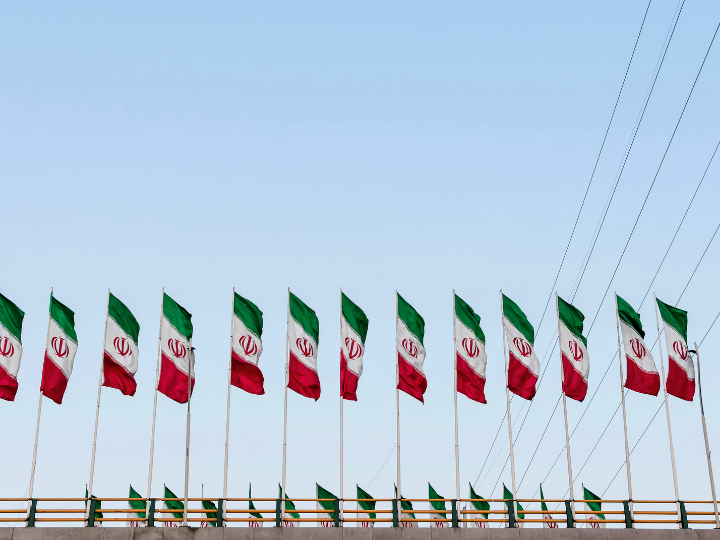by Cornelius Adebahr*
If it wasn’t such a serious matter, one could call Iran the comeback kid.
In the fall of 2022, when protests quickly spread across the country after the death of Mahsa Jina Amini, many observers predicted—and wished for—the end of the Islamic Republic. Just one year later, following Hamas’s atrocities in Israel and with the Houthis attacking commercial ships in the Red Sea, Tehran is painted as the all-powerful evil behind the region’s most recent convulsion.
The reality, it would seem, is more mundane. The regime remains fragile at home but skillfully uses every opportunity on the international scene to increase its clout. Like a giant with feet of clay, as per the Biblical reference to the Persian empire of the antiquity, it appears huge but is also vulnerable.
In fact, over the past couple of years, important shifts have taken place at three levels—the regional, global, and domestic. European policymakers need to take note of and adapt to these changes. Old conceptualizations of the Islamic Republic no longer serve.
At the regional level, Iran is mainly seen through the so-called proxies it purportedly commands. From Hezbollah in Lebanon to Hamas in Gaza, and from the Badr Organization and Kataib Hezbollah in Iraq to the Houthis of Yemen, Tehran does indeed closely collaborate with organizations that share its goals, mainly those emanating from a shared enmity with Israel and the United States.
However, the degree of Iranian control over these groups’ actions is usually overstated, as evidenced by the years-long fallout with Hamas when the Palestinians refused to back Iran’s ally in the Syrian civil war, or when Tehran was at pains to dial down the escalation caused by a deadly Iraqi militia strike against a U.S. base in Jordan in February this year.
More fundamentally, Tehran has used the dynamics of the past years to pressure its neighbors into cooperation rather than confrontation. When Gulf states were adamantly opposed to the lifting of Iran’s pariah status as part of the 2015 nuclear deal, they started reaching out to Tehran. This shift occurred after Washington did not come to their aid following a string of Iranian-sponsored attacks on their territory in 2019. Remarkably, while several Arab countries sought normalization with Israel under the Abraham Accords, they also sought accommodation with Iran in very practical terms, from trade exchanges to pilgrimage issues and maritime security. Just a little over a year ago and with facilitation from Beijing, Riyadh and Tehran reestablished diplomatic relations cut off in early 2016 over a sectarian dispute.
Internationally, Iran no longer seeks to reach out to the West, as it did throughout the decade-long negotiations over its nuclear program. The United States pulling out of the so-called nuclear deal under then president Donald Trump and not reinstating it under President Joe Biden proved, in Tehran’s eyes, America’s utter unreliability. Meanwhile, Europe watched helplessly from the side, underscoring the continent’s irrelevance.
Instead, Iran has firmly anchored itself not so much in “the East” but in the anti-Western or, at least, “alternatives-to-the-West” camp.
Exhibit A, from a European point of view, is Tehran’s emerging military cooperation with Russia, which entails providing drones and, reportedly, missiles for the Kremlin’s war against Ukraine. This constitutes a direct—and not just hypothetical, as with a possible nuclear bomb—threat to European security. Last summer, Iran joined the Chinese-Russian-led Shanghai Cooperation Organisation, which branched out from its original Central Asian focus to include India and Pakistan. As of 2024, it is a BRICS member alongside Egypt, Ethiopia, and the United Arab Emirates, marking the grouping’s near-doubling in terms of member countries and important expansion into the Middle East.
Lastly, the Islamic Republic today is singularly focused on regime survival with little to no room for even the most basic concerns of the population. The recent parliamentary election made clear that the leadership no longer cares about the veneer of popular legitimacy that it used to uphold. It cleared the electoral lists from all candidates not conforming to the few shades of conservatism it allowed, resulting in a record low turnout—41 percent—and many invalid votes cast. With the parliament remaining under the supreme leader’s control, eyes are set on next year’s presidential “contest” which should see the confirmation, as is customary under the Islamic Republic and despite his hapless governance, of the incumbent, Ebrahim Raisi, for a second term.
This will pave the way for the inevitable transition at the top, given Supreme Leader Ali Khamenei’s age—he’s nearly 85—and uncertain health. Upon his passing, the Assembly of Experts will appoint a successor, and this body has just been stuffed with hardline clerics for an eight-year term. Given that the last such transition took place thirty-five years ago in the aftermath of the Iraq-Iran war, this will be a momentous and, possibly, path-determining point.
For Europe, this means it has to see Iran as what it is, rather than what it wants the latter to be, whether powerful bogeyman or doomed villain. The regime is regionally and internationally much less isolated today than a few years ago, with both friends in high places and neighbors that stubbornly pursue their interests while holding their noses. The regime is also more insecure about its own future than its brutal yet successful crackdown of the months-long feminist revolt in 2022–23 would suggest.
At the same time, the EU’s own approach—sanctions and even more sanctions—seems to have reached a dead-end. Only with a sober and comprehensive assessment of the set of challenges Iran poses for Europe can Brussels devise a policy that stands a chance of being effective on the ground.
*nonresident fellow at Carnegie Europe and his research focuses on foreign and security policy, in particular regarding Iran and the Persian Gulf, on European and transatlantic affairs, and on citizens’ engagement
**first published in: Carnegieeurope.eu




 By: N. Peter Kramer
By: N. Peter Kramer
